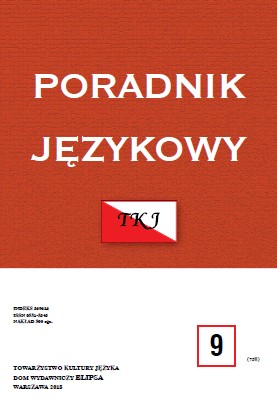STULECIE EMANCYPANTEK EWOLUCJA GNIAZDA LEKSYKALNEGO <EMANCYPACJA>
A CENTENARY OF EMANCIPATIONISTS. THE EVOLUTION OF THE LEXICAL NEST <EMANCIPATION>
Author(s): Radosław PawelecContributor(s): Monika Czarnecka (Translator)
Subject(s): Theoretical Linguistics, Lexis, Historical Linguistics, Western Slavic Languages, Philology
Published by: Dom Wydawniczy ELIPSA
Keywords: Emancipation; Emancypacja; Polish language; lexeme; process of gaining freedom and independence;
Summary/Abstract: The word emancypacja (emancipation) in Polish is a 14th-century borrowing from Latin. It was used to refer to the process of gaining freedom and independence by various people and social groups, in particular peasants, Jews and women in the Poland of that time. The lexeme is recorded and accurately described in dictionaries, which also point to a special position of emancipation of women among emancipation processes: it concerned the largest number of people and assumed the form of a decades-long and complex process. The quotations collected in the Files of Słownik języka polskiego (Dictionary of Polish) edited by W. Doroszewski prove the power and diversity of emancipation movements and permit the reconstruction of the controversies behind emancipation of women. Nowadays, the words from this nest can be seen mainly in books and are often used in historical contexts. The current problems related to the question of women’s status are referred to with words from the feminism nest, some of which are similar to and others different from emancipation.
Journal: Poradnik Językowy
- Issue Year: 2018
- Issue No: 09
- Page Range: 7-21
- Page Count: 15
- Language: Polish
- Content File-PDF

